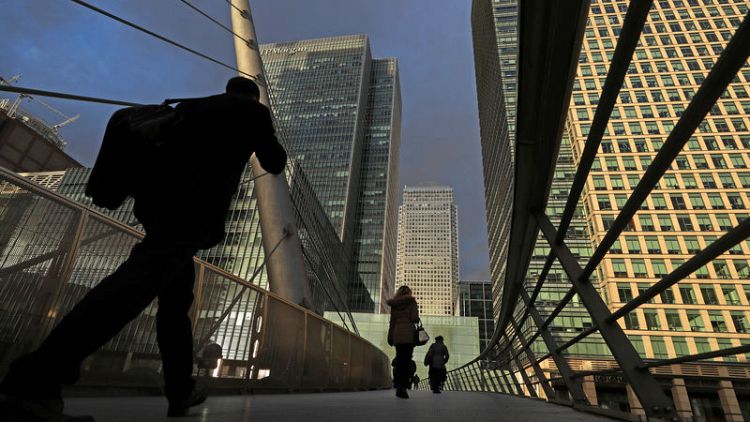By Andy Bruce
LONDON (Reuters) - Britain's economy is in serious danger of entering its first recession since the financial crisis as business confidence wilts in the Brexit chaos, a closely watched business survey showed on Wednesday.
Growth in Britain's dominant services sector slowed to a crawl in August and business expectations were at their lowest in more than three years, according to the IHS Markit/CIPS UK Services Purchasing Managers' Index (PMI).
Its headline reading fell to 50.6 from 51.4 in July -- barely above the 50 barrier between growth and contraction. A Reuters poll of economists had pointed to a reading of 51.0.
The survey added to questions over Britain's ability to bounce back from an economic contraction in the second quarter when a hangover from the stockpiling boom before the original Brexit deadline in March hit output.
PMI compiler IHS Markit said the overall economy looked on track to shrink again in the July-September period at a quarterly rate of 0.1% -- a result that would officially herald a recession.
Signs the economy is fading will raise the stakes in the political crisis gripping Britain.
Prime Minister Boris Johnson will try to call a snap election on Wednesday after lawmakers seeking to prevent him taking Britain out of the European Union without a divorce deal dealt him a humbling parliamentary defeat.
"A lot will hinge on the events today in Westminster, but the bottom line is that risk of a 'no deal' Brexit on 31 October is unlikely to fade completely after this week. This will continue to keep the pressure on underlying growth," ING economist James Smith said.
August marked the eighth month running in which the British composite PMI, covering both the manufacturing and services sectors, has underperformed the euro zone equivalent.
The British PMI's gauge of optimism in the services sector fell to its lowest level since July 2016, the month just after the Brexit vote, while growth in new orders slowed sharply.
Some economists say surveys like the PMIs tend to overstate the extent of upturns and downturns, but they are nonetheless closely watched by the Bank of England as early indicators of moves in the wider economy.
"The PMIs are excessively influenced by business sentiment and have given a misleadingly weak steer during the past 12 months of heightened political uncertainty," said Samuel Tombs, economist at consultancy Pantheon Economics.
BoE Governor Mark Carney and other members of the Monetary Policy Committee are due to answer questions from lawmakers at 1315 GMT.
JPMorgan said the weakening data could prompt the BoE to consider whether it might need to cut interest rates in scenarios other than a no-deal Brexit, such as an extension of the Brexit deadline with no clarity on what happens next.
"We do not yet expect the BoE to signal a significant shift in tone while the question of the timing and outcome of a snap election is still up in the air. But the odds of a BoE cut this year -- even if no-deal is avoided -- are going up," said JPMorgan economist Allan Monks in a note to clients.
(Reporting by Andy Bruce; Editing by Catherine Evans)



